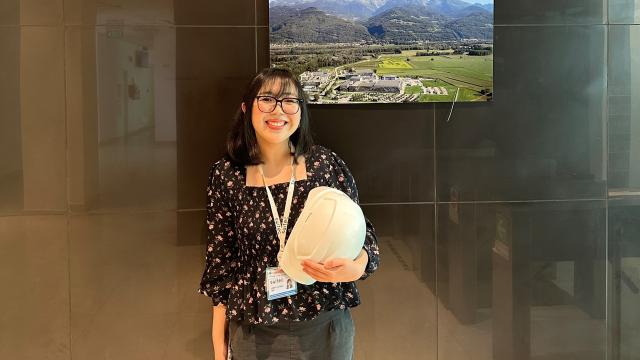Meet #SITizen Dhanya Davita Devarajoo from the Nursing degree programme, jointly offered by the Singapore Institute of Technology and University of Glasgow.

During Dhanya Davita Devarajoo’s polytechnic internship at a hospice, she helped a patient with end-stage cancer find comfort in his final days.
With no family, she and her colleagues were his only companions. “When it actually came to the point when he was passing, he felt very grateful we were there at the end,” Dhanya recalled. “It was very fulfilling.”
The stint sparked her interest in the nursing profession, particularly in palliative and geriatric care, a field that is becoming increasingly relevant here as Singapore faces an ageing population.
She chose the Nursing degree programme, jointly offered by the Singapore Institute of Technology (SIT) and University of Glasgow (UofG) due to its strong relevance in the country’s healthcare system.
Going global
SIT’s nursing programme does not only have a local focus. Its collaboration with UofG has also given Dhanya and her schoolmates a broader and more international perspective.
With a module that compares Singapore’s healthcare system to that of Scotland’s, as well as the signature Overseas Immersion Programme (OIP), Dhanya and her course mates benefitted from a holistic learning journey and experienced first-hand how other countries do things differently.
“It gives us an insight – we can apply these lessons to Singapore and look at what to improve on,” she said.
While Dhanya was unable to go for the OIP because of the COVID-19 pandemic, she was still able to get attachment opportunities at a local nursing home, where she observed its settings and assessed how patient care could be done better.
“It provided us with opportunities to learn more than just theory,” she said. “It’s truly holistic.”
One of her favourite modules was on managing long term care, which covers a complete range of nursing competencies focusing on patients with chronic conditions. “We’re not only managing illness, but all aspects of their health, be it mental or physical,” she said.
To complement these practical lessons, the curriculum includes a study on Singapore’s healthcare practices. “They teach us how to critique and improve it, so when we join the workforce, we are adept at handling them,” she added.
That is not the only way SIT has prepared her for her nursing career. Its Teaching and Learning module has also helped pave the way to achieving her eventual goal of becoming a nurse educator, a role that helps train aspiring nurses like herself.
“I found it very useful as it was based on practical knowledge,” she noted. “It gave me a better understanding on how to conduct lessons in teaching, and how people learn.”
Gaining Confidence
Besides practical knowledge, SIT also gave Dhanya an intangible boost: empowering her with self-confidence.
Although nursing runs in her family, with her mother and two cousins in the profession themselves, her parents were initially apprehensive when she wanted to become one.
“My mom shared that this is not an easy job,” she said. “You’re going to have to say goodbye to your weekends. You have to say goodbye to dressing up and looking nice for work. There were plenty of restrictions.”
At SIT, her professors helped her overcome this doubt.
“We had an encouraging lecturer who always told us that we’re going to be Singapore’s nursing leaders,” she said. “We have to take pride in the work we do – not everyone can do it.”
Her lecturers’ encouragement, coupled with seeing nurses as courageous frontline warriors against the recent pandemic, has helped her overcome this insecurity. “I really take pride in my career choice,” she said. “Now, instead of telling people that ‘I’m just a nurse’, I’ll tell them: ‘I’m proud to be a nurse!’”
Dhanya is now a full-time Staff Nurse at Woodlands Health Campus.
![[FA] SIT One SITizen Alumni Initiative_Web banner_1244px x 688px.jpg](/sites/default/files/2024-12/%5BFA%5D%20%20SIT%20One%20SITizen%20Alumni%20Initiative_Web%20banner_1244px%20x%20688px.jpg)


